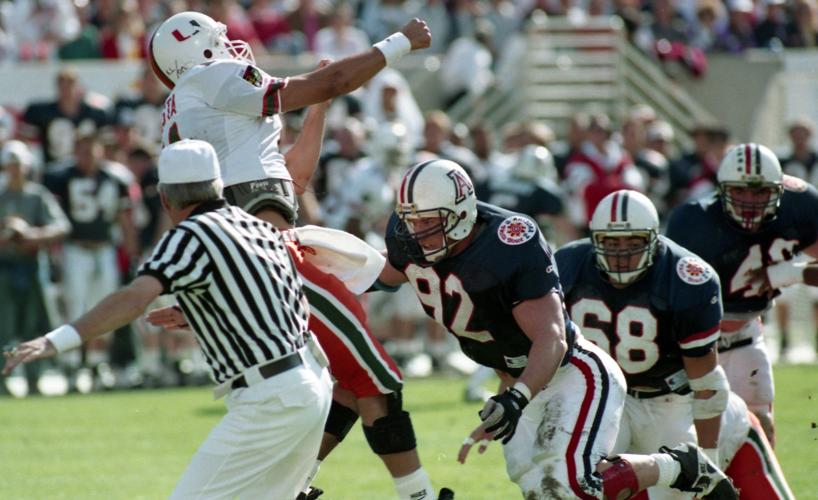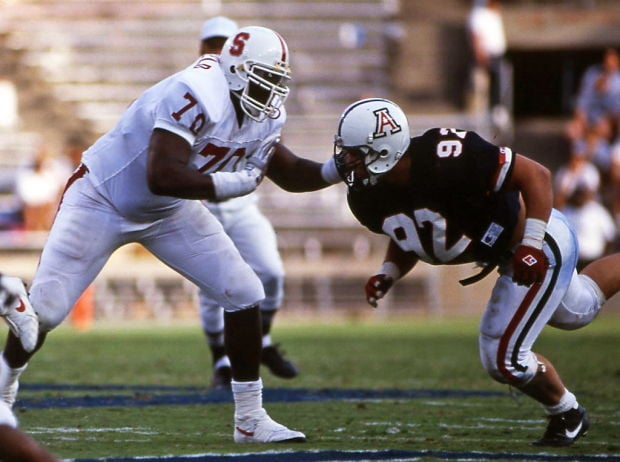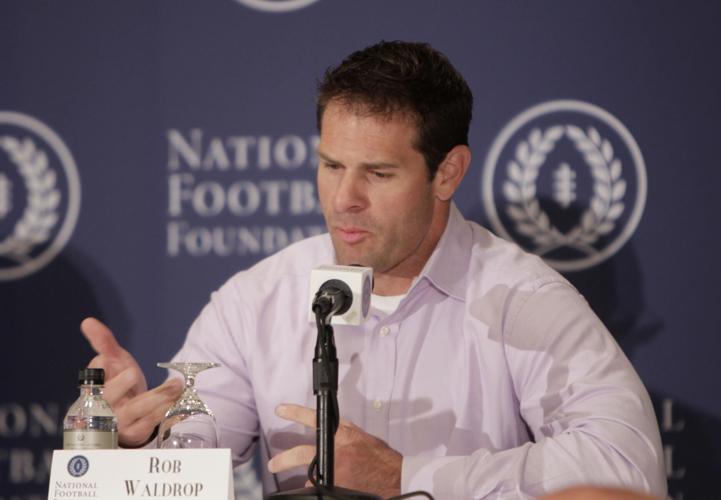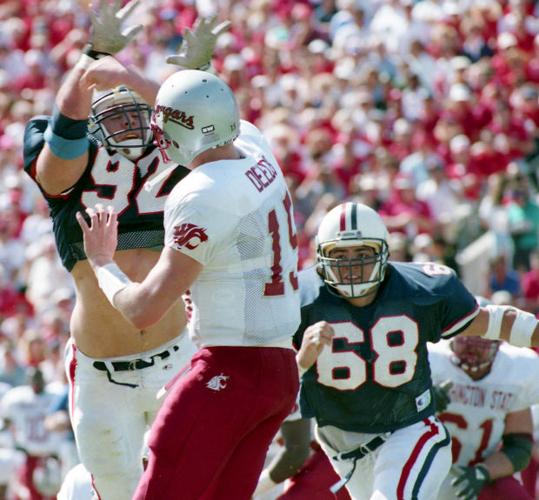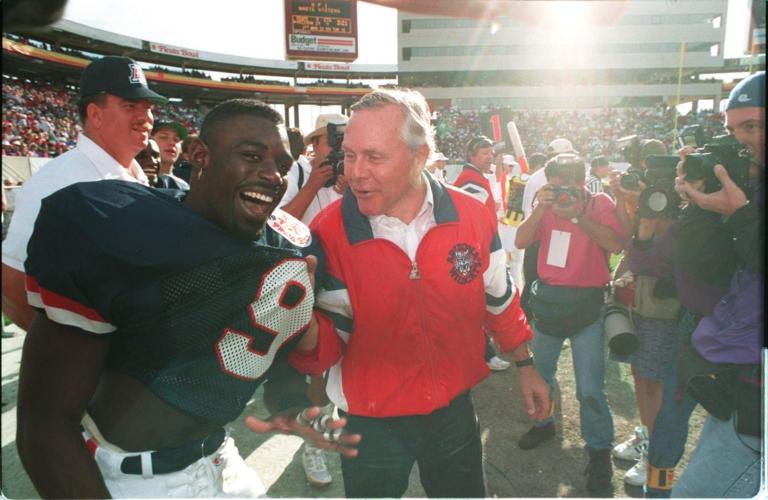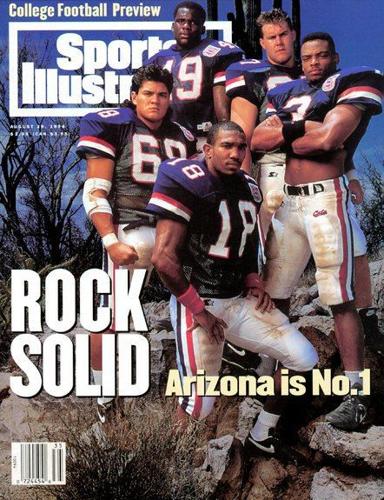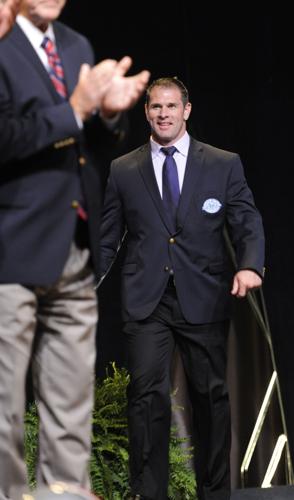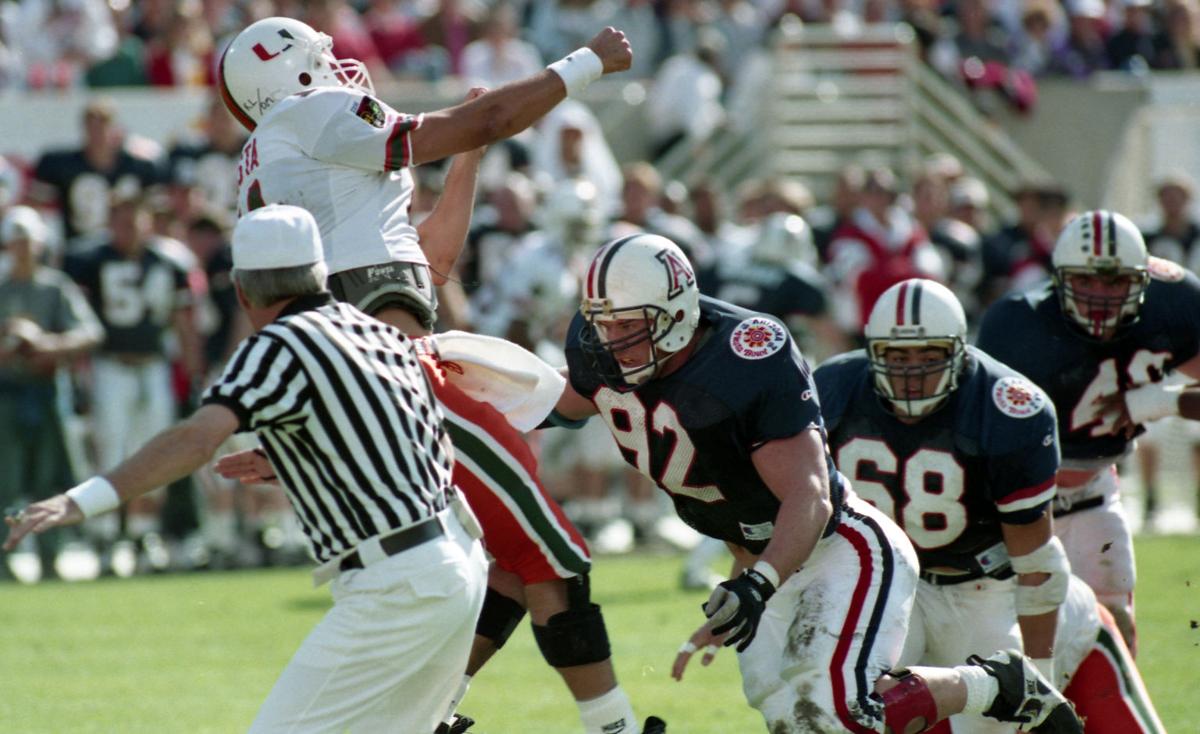When Rob Waldrop signed with Arizona out of Scottsdale Horizon High School in 1990, he just wanted to be productive under head coach Dick Tomey.
The former UA defensive tackle was so productive, he became a College Football Hall of Famer, a two-time All-American, a Pac-10 Defensive Player of the Year and a Bronko Nagurski Trophy, Outland Trophy and Morris Trophy winner. Waldrop finished his UA career with 171 tackles, 22.5 sacks and 45 stops for loss.
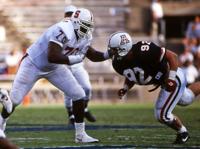
Rob Waldrop, right, against Stanford in 1991. Waldrop finished his UA career with 171 tackles, 22.5 sacks and 45 stops for loss.
Waldrop was a part of the “Desert Swarm” defense’s foundation that led Arizona to a shutout victory over the Miami Hurricanes in the 1993 Fiesta Bowl, before he went on to play for the Kansas City Chiefs and the CFL.
“When I look back on all that, it’s not something I could’ve planned or would’ve thought of,” Waldrop said. “I set my goals very simple and just play every play the best that I can. ‘When I leave college, I want to look in the mirror and say that I left it out there. That’s who I am. I’m either good or I’m not.’ ... As I get older and look back on it more, I appreciate it more. I share more stuff like that with my son, and it just means a lot more to me now that I’m older. In life, all you end up with is money and memories, right? I’ve got a lot of good memories from that time. I wouldn’t trade it for nothing.”

Arizona defensive tackle Rob Waldrop walks on stage during the College Football Hall Enshrinement dinner Saturday July 21, 2012 in South Bend, Ind. (AP Photo/Joe Raymond)
Waldrop, who is one of three of honorary captains for Arizona this season along with Super Bowl MVP Nick Foles and most recently Randy Robbins, joined “Spears and Ali” on ESPN Tucson to discuss the 30-year anniversary of the historic ‘93 team, Tomey’s legacy, and how Desert Swarm would’ve fared in the current Name, Image and Likeness era:
How do you reflect on that ‘93 team now that it’s been 30 years?
A: “Everyone wants to keep reminding me about that 30 years thing, you keep dating me and putting an age on me. But yeah, it’s hard to encapsulate all of that. That was some of the greatest times of my life with the guys that I played with on that team and playing for Coach Tomey. It’s something that the more time passes, the more we appreciate and enjoy that and the lessons we learned.
“We had a lot of guys that had a lot to prove as juniors, so we went down there against (No. 1) Miami (in 1992), had a really close game and lost (8-7). That’s when the (Desert Swarm) defense was born. So we were all very thankful to have the opportunity back against Miami in the Fiesta Bowl. To finish with that win was a great cap to everything. It was also tough because it was saying goodbye to my college career and those teammates and guys we played with for all those years. That special bond that we had, for us that was one of the pinnacles other than that ‘98 team for Arizona football.”

Former Arizona defensive tackle Rob Waldrop speaks during a news conference in New York in 2011, when he was one of 14 players and two coaches to be part of that year's College Football Hall of Fame class.
What was the secret to defensive success Arizona had during that time period?
A: “I get this question a lot, but it was really the bond with the guys. We played for each other, we loved each other, and we were molded together. Coach Tomey used to pick on the defense in practice. I don’t know if he did that by design.
“We would scrimmage the offense and whoever won didn’t have to run to wind-sprints. He would never let us win. He would call penalties and say, ‘Unsportsmanlike conduct, redo the down.’ He would never give us a chance, and then when we would win, because he couldn’t keep just doing that, he would make us run anyways and say that we’re a team.
“But if it was the other way around and the offense won? They wouldn’t run wind-sprints. He drove us together and he taught us a lot about adversity in the process, and so when the chips were down and we were in a close game, we wanted to be on that field. If it was fourth-and-inches and we needed a stop to win the game, it wasn’t a big deal to us because we had done it so many times in practice.”

Tedy Bruschi of Arizona, right, runs to assist Rob Waldrop, left, trying to sack Washington State quarterback Shawn Deeds on Oct. 24, 1994.
What was the dynamic like between you and defensive end Tedy Bruschi on the defensive line?
A: “We had a great relationship on the field. Tedy is a wild man. He was a little different. I’m a little more calmer, and he’s a little bit more jacked up all the time and brought a lot of energy. He was also coming around and doing really awesome when he was young. He was a sophomore while I was a senior, so when I left, he was there killing for a while.
“He got to be a part of a great defense that set up a system that he was able to take advantage of one or two of those years and with his talent level, he was destroying people. Without him on the edge, like we had in many situations, we wouldn’t have had the same kind of pressure, because they wouldn’t have been able to double-team everybody in the middle.”
What do you remember about the first time Tomey recruited you?
A: “What I remember most about Coach Tomey is that he’s just a down-to-earth guy. He came into our house, took his shoes and socks off, sat on the couch and started rifling through the stuff that my mom put out there and made himself right at home.
“He brought a calm, comforting kinda thing, and what I remember most is that he didn’t really guarantee anything other than, ‘Hey, we’ll give you an opportunity, we’re very interested, but you’ve gotta earn everything that you make. But I’ll make a commitment to you that I’ll take care of you as a young man and make sure you get an education. And then, as long as you work hard, you’ll play and have fun, and we’ll do good.’
“It was a commitment beyond the X’s and O’s, and that’s what mattered to me the most.”

University of Arizona coach Dick Tomey enjoys the aftermath of the Wildcats' 29-0 victory over the University of Miami in Fiesta Bowl XXIII on Jan. 1, 1994. UA finished the 1993 season ranked No.10.
What was it about Tomey that made him a great leader of men?
A: “I wish I could encapsulate that in a short thing. I think it’s his empathy, but also his desire to hold you accountable and teach you what the right thing is.
“He had a saying: ‘Say what you’re going to say and then we move on.’
“There may have been a cuss word or two in there, but I won’t say it. So if you stepped out of line or did something wrong, he would let you have it, but it was never brought up again. That was it. We moved on and went to the next thing, so he teached us lessons in life that was full of adversity. He would be like a parent and hold you accountable, but love you just as much the next day.
“I think the players over the time respected that and went, ‘I can trust this guy. He may get mad at me, but I know he’s always going to be there for me.’”

SI picked Arizona to win a national championship in 1994. UA finished just 8-4.
How do you think the Desert Swarm defense would’ve capitalized on the NIL opportunities currently available in college athletics?
A: “I was just having this conversation with (former Arizona safety) Brandon Sanders, who’s a coach at the U of A, and he explained to me how all of that worked, and I think you wouldn’t have had a Desert Swarm.
“Even he brought that up and said, ‘Most of you guys after that big year would’ve hit the transfer portal and went somewhere else for NIL money.’ That’s how it works these days.”
Arizona running back Michael Wiley and linebacker Justin Flowe spoke to local media on Tuesday. Video by Justin Spears / Arizona Daily Star


